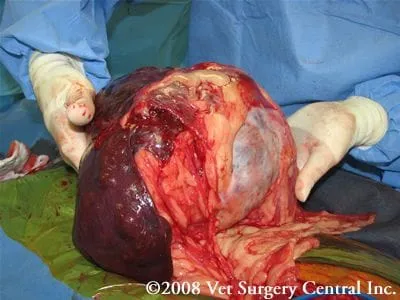Key Points
Two-thirds of all splenic tumors are maligant and the remainder are benign
Of the malignant tumors, about two-thirds of them are hemangiosarcoma
About 70% of the dogs that have internal bleeding due to a ruptured splenic tumor have hemangiosarcoma.
Prognosis with dogs that have hemangiosarcoma is highly variable – some dogs live for about 1 year yet others for only a few weeks
Anatomy and Physiology
- The spleen is attached to the stomach by the gastrosplenic ligament and its blood supply
- The spleen has a tremendous blood supply and is a reservoir for red blood cells
- The spleen is a filter which cleanses the blood by removing old red blood cells
- Dogs and cats can function normally without a spleen as the liver will take over its function
Diseases of the spleen
- Tumors
- Breeds most commonly affected
- Golden retrievers
- German shepherds
- About two thirds of the masses found on the spleen are malignant; of the malignant tumor types, two thirds of these are hemangiosarcoma; the bottom line is that about 45% of all splenic masses are hemangiosarcoma, which carries a very guarded prognosis
- Benign: fibroma, leiomyoma, and others
- Malignant: hemangiosarcoma (most common), lymphosarcoma, mast cell tumor, leiomyosarcoma, and many more
- Hemangiosarcoma is the most common tumor and frequently results in rupture of the spleen. Internal bleeding occurs and shock usually results. Hemangiosarcoma is a malignant tumor that usually spreads to the liver, lungs, brain, spinal cord, skin, muscle, and fat beneath the skin. Usually at the time of diagnosis of this tumor malignant cells have spread to other internal organs, thus with time the pet will most likely die of recurrent cancer.
- Breeds most commonly affected
- Splenic torsion
- In this condition the spleen twists along the axis of the blood supply
- The vein which drains the blood is completely occluded, but the artery continues to pump blood into the spleen
- The spleen becomes very large due to engorgement with blood
- Eventually blood clots develop in the blood vessels and the spleen dies off (called necrosis)
- This condition is very painful and makes the patient very ill
Clinical signs of diseases of the spleen
- Pale gums – due to bleeding into the abdomen from a ruptured tumor
- Distention of the abdomen
- Hard mass sometimes can be felt in the abdomen
- Weakness
- Loss of appetite
- With chronic splenic torsion, the urine may develop a dark red-brown (Port wine urine) color due to break down of red blood cells and excretion of hemoglobin
Diagnostic tests
- Complete blood cell count
- Chemistry profile/urinalysis
- Chest radiographs (x-rays) to check for spread of cancer
- Ultrasound of the abdomen to evaluate the spleen, liver, and other abdominal organs
Stabilization
- Many patients that have splenic tumors or splenic torsion show signs of shock (pale gums, low blood pressure) and need to be stabilized by having intravenous fluids given and sometimes a blood transfusion
- The heart is monitored for abnormal rhythm
- Abdominal exploratory is performed to examine the internal organs
- If hemorrhage has occurred prior to the operation, the free blood is removed and the abdominal cavity rinsed with saline
- The spleen is removed
- If cancer is a concern the liver and spleen are biopsied
- Below is a photo of a spleen that has a hemangiosarcoma tumor
Aftercare
- Fluid therapy
- Blood pressure, heart rate, gum color are monitored
- Continuous ECG is used to monitor the heart
- About 60% of the dogs undergoing splenectomy will have abnormal heart heats or arrhythmias
- Arrhythmias can be fatal, therefore treatment is sometimes needed
Prognosis
- Surgery can be curative if a benign disease is present
- Hemangiosarcoma, the most common type of tumor of the spleen is highly malignant
- Most dogs with this disease have microscopic spread of the tumor to the lungs, liver, heart or other regions of the body
- Chemotherapy (5 treatments of Adriamycin 30mg/M2) and surgery yield a median survival from 90 to 280 days
- Tumor vaccine which is made from the patient's tumor when given alone, gives a similar survival time as adriamycin chemotherapy in patients with hemangiosarcoma. This involves 3 injections of the vaccine, given weekly.
- I'm Yunity, a mushroom extract, has anti-cancer effects and can improve survival of patients with hemangioarcoma. Here is a link for more information about I'm Yunity (dosage, cost, ordering, white paper etc): https://www.buyimyunity.com/?store-page=-p19279717
- Patients with hemangiosarcoma are prone to developing bleeding from a tumor. Yunnan Baiyaou is a product that thickens the blood, thus making the patient less prone to bleeding. A red pill, which is very potent, located in the pill blister packet can given if your pet has an acute bleeding crisis. The dose of Yunnan Baiyaou is one 250 mg tablet per 20lb body weight every 8 hours. You may find this product on Amazon.com, but supply is inconsistent. Other Chinese herb venders are found on line.
- Prognosis for splenic torsion is excellent, providing that no complications such as DIC develop
Potential complications
- Anesthetic death
- Infection
- Arrhythmias of the heart
- Instant death due to arrhythmias
- Disseminated intravascular coagulation (DIC) – abnormal clotting occurs and pet usually dies
- Internal bleeding
- Hemobartonella infection – parasitic infection of the blood, which is normally cleared by the spleen
- In our experience, most dogs that have the spleen removed survive; we attribute this to with the aggressive intensive monitoring and treatment provided at our hospital
References
- Aronsohn MG et al. Prognosis for nontraumatic hemoperitoneum in the dog: a retrospective analysis of 60 cases (2003-2006). J Am Anim Hosp Assoc 2009 45(2):72-77.
- Hammond TN et al. Prevalence of hemangiosarcoma in anemic dogs with a splenic mass and hemoperitoneum requiring a transfusion: 71 cases (2003-2005). J Am Vet Med Assoc. 2009 Feb 13;232(4):553-8.



